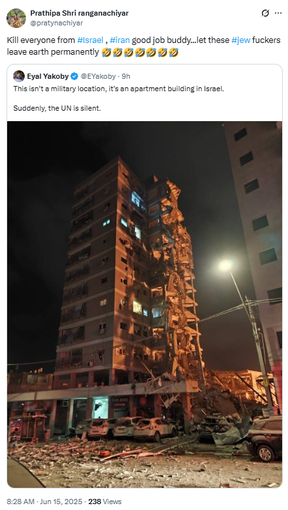And sometimes pronouncements from world leaders, such as Canada’s Prime Minister, can have deadly consequences

Article content
Canada, France and the United Kingdom recognize a “state” run by terrorists. Canada’s Prime Minister accuses Israel of violating international law. The International Criminal Court issues warrants for the arrest of Israel’s Prime Minister.
Advertisement 2
Article content
Sometimes, such pronouncements made by governments seem completely detached from reality. None of those countries have yet set up an embassy in Gaza City, for example. Nor has Canada commenced a court action against Israel. No country, as far as we know, has attempted to place Benjamin Netanyahu under arrest.
Article content
Article content
But it would be a mistake to shrug about the pronouncements of world leaders, or to dismiss their words as meaningless symbols. For Jews, these dark days, words can have real-life impacts. Sometimes, the consequences can be deadly.
CyberWell is an Internet watchdog that closely tracks antisemitism on social media. When the Israel-based non-profit finds hate online, it notifies the social media platforms, and urges them to take it down. And two recent reports by CyberWell show that the words and actions of governments can, and do, result in shocking eruptions in cyber-hate.
Article content
Advertisement 3
Article content
A recent example: the twelve-day war between Israel, the United States and Iran took place in June 2025. That conflict saw Israel launch hundreds of airstrikes against the Islamic republic – and Iran firing thousands of ballistic missiles and suicide drones at Israeli military and civilian targets. Israel was largely seen as the victor.
Read More
-

KINSELLA: Canada to recognize Palestinian state despite Hamas’ atrocities?
-

KINSELLA: Netanyahu a big part of why Israel is losing propaganda war
-

KINSELLA: Canada once mattered on the international stage – not anymore
Online, the abbreviated Iran-Israel war had a very different outcome. Online, Iran was the hands-down victor. During and after the conflict, CyberWell found, and “across platforms like TikTok, Facebook, and X, users once again used digital spaces to post antisemitic rhetoric, incitement to violence, and coded hate speech – at times under the guise of political commentary or religious solidarity.”
Advertisement 4
Article content
It’s not a new phenomenon, CyberWell notes, and it’s getting worse all the time: “Each new flashpoint acts as a trigger for dangerous digital discourse that can quickly spill into real-world harm.”
For example: during the Iran-Israel war, the words “Khaybar, Khaybar, O Jews” were all over social media, in the Farsi and Arabic languages. The phrase refers to a long-ago battle in Khaybar, which was a Jewish town in what is now Saudi Arabia – and where Muslim forces massacred the Jewish population. The “Khaybar, Khaybar, O Jews” slogan has been used, for centuries, to call for pogroms against Jews.
On X, as the war commenced, that hateful phrase grew by more than 3,000% over the previous months. Midway through the conflict, it increased by nearly 7,000% over before. By the end of the war, those words had reached three million individual accounts. The Farsi version of the chant far outpaced the Arabic one, too.
Advertisement 5
Article content
Some of the posters were very specific. After activist Eyal Yakoby simply posted a photo of an Israeli apartment building destroyed by an Iranian missile, “@pratynachiyar” wrote: “Kill everyone from Israel, Iran, good job buddy…let these Jew f**kers leave Earth permanently.”

And, tragically, killings were indeed happening. As the Jew hatred was growing dramatically online – as more and more governments were showing a willingness to isolate and attack the Jewish state – actual murders happened.
So, just days before the war started, two young Israeli embassy staffers were assassinated outside the Capital Jewish Museum – and the alleged shooter yelled “Free Palestine” as he was arrested by police. Days later, an elderly Jewish woman died after being set ablaze in Boulder, Colorado – again, by an alleged killer who reportedly yelled “Free Palestine” – a phrase that was, and is, ubiquitous online.
Advertisement 6
Article content
As CyberWell puts it: “These are not isolated incidents. They are part of a dangerous, recurring cycle that CyberWell has repeatedly warned about: inflammatory content spreads online, fuelling real-world hate and violence. Each act of violence or hate speech online reinforces the next, creating a self-perpetuating loop.”
The “loop,” as CyberWell puts it, has recently gone like this: witless Western governments demonize Israel, which leads to antisemitic propagandists doing likewise online, which then legitimizes – and leads to – actual antisemitic crime and violence.
It needs to stop.
Police and prosecutors need to get better at fighting antisemitic crime. Social media platforms need to do a better job of moderating what’s being posted online.
And governments, like Canada’s, need to recognize that what they say can sometimes result in real-life harm.
Sometimes, in fact, it can result in death.
Article content



